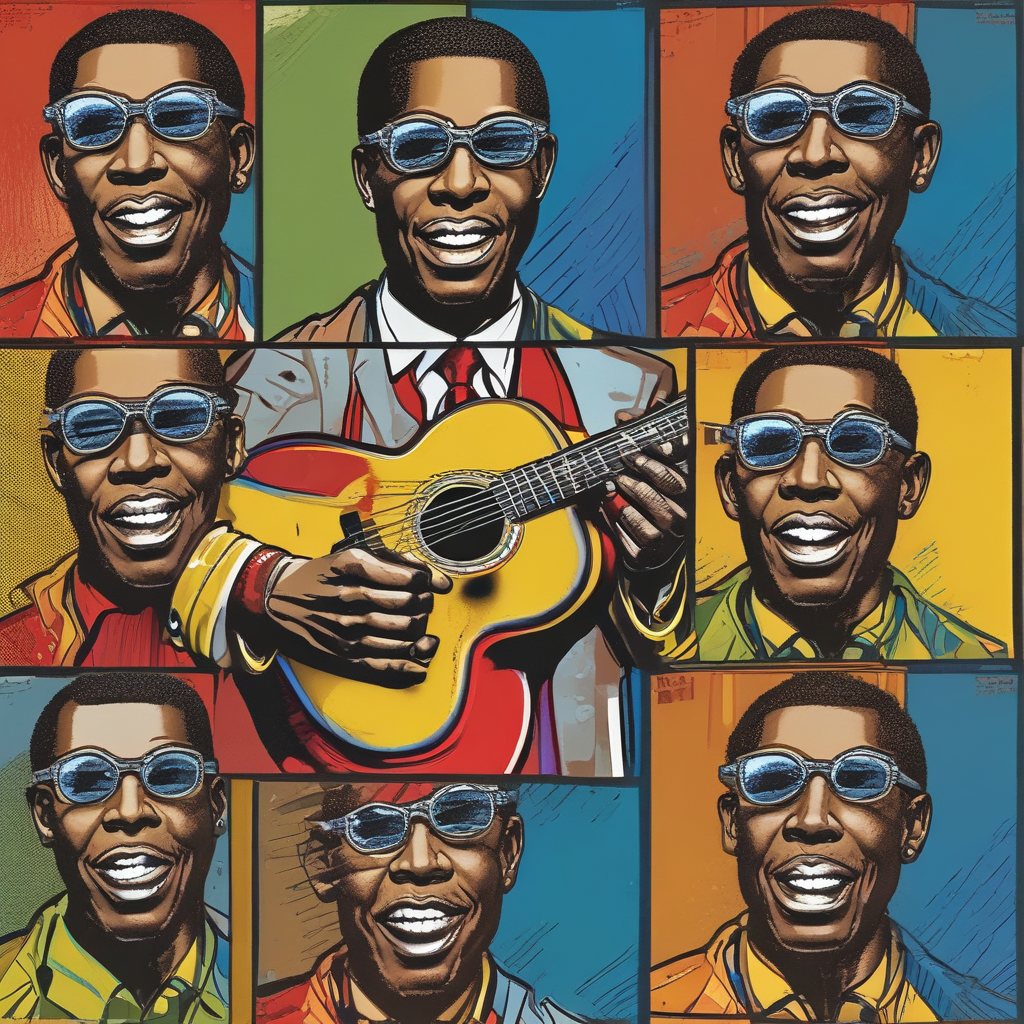Blind Willie Johnson Overview

- Estimated Net Worth: $100,000 (approximate, adjusted for inflation)
- Age: 48 (at the time of death)
- Born: January 25, 1902
- Died: September 18, 1945
- Gender: Male
- Country of origin: United States
- Source of wealth: Music (blues and gospel)
Early Life and Background
Blind Willie Johnson was born in 1902 in Pendleton, Texas, into a family of modest means. His father was a sharecropper, and his mother was a homemaker. Tragically, Johnson lost his sight at the age of seven due to an accident involving his stepmother, which profoundly influenced his life and music. Despite this setback, he developed a passion for music early on, inspired by the spirituals sung in his community.
Growing up in a religious household, Johnson was heavily influenced by the church and the gospel music that permeated his environment. His early exposure to the sounds of blues and gospel laid the foundation for his unique style, which blended both genres. He learned to play the guitar, often using a slide technique that became his signature sound.
Johnson’s family faced financial hardships, which limited his formal education. However, he was resourceful and learned to play music by ear, honing his skills through practice and performance at local gatherings. His early experiences shaped his worldview and musical expression, leading him to create songs that resonated with themes of suffering and redemption.
By the time he reached adulthood, Johnson had begun to perform in local churches and on street corners, earning small amounts of money. These early performances were crucial in building his confidence and reputation as a musician, setting the stage for his future career in the music industry.
Career Beginnings
Blind Willie Johnson’s professional career began in the late 1920s when he moved to Dallas, Texas. His first significant break came when he recorded his first songs in 1927 for Columbia Records. His initial recordings included tracks like “Dark Was the Night, Cold Was the Ground,” which showcased his haunting voice and innovative guitar playing. These early sessions earned him approximately $50 per recording, a modest sum that reflected the nascent state of the recording industry.
Despite his talent, Johnson faced numerous challenges in the early stages of his career. The Great Depression had a profound impact on the music industry, leading to reduced opportunities for artists. Additionally, as a blind musician, he encountered societal barriers that made it difficult to secure consistent work. However, his determination and unique sound helped him carve out a niche in the competitive blues scene.
During this period, Johnson often performed at local churches and community events, where he could connect with audiences on a personal level. His performances were characterized by emotional depth and spiritual fervor, which resonated with listeners. This grassroots approach allowed him to build a loyal following, even as he struggled to achieve commercial success.
By the early 1930s, Johnson had recorded several more tracks, but financial stability remained elusive. He continued to perform and record, gradually gaining recognition for his contributions to the blues genre. His early career laid the groundwork for his later successes, demonstrating his resilience and commitment to his craft.
Major Breakthroughs
Blind Willie Johnson’s major breakthroughs came in the late 1920s and early 1930s, particularly with the release of his iconic song “Dark Was the Night, Cold Was the Ground.” This track, recorded in 1927, is often regarded as one of the greatest blues songs of all time. Its haunting melody and profound lyrics captured the attention of both audiences and critics, significantly boosting Johnson’s profile in the music industry.
In 1930, Johnson recorded “Jesus Make Up My Dying Bed,” another pivotal song that showcased his unique blend of gospel and blues. This track further solidified his reputation as a pioneering artist in the genre. The success of these recordings led to increased demand for his music, resulting in higher earnings from record sales and performances.
During this period, Johnson’s recordings began to sell more widely, with estimates suggesting he earned around $200 per session, a substantial amount for the time. His music was played on radio stations, expanding his reach beyond local audiences and introducing him to a national audience. This newfound visibility contributed to a significant increase in his net worth.
Johnson’s breakthrough moments were not just about financial gain; they also marked a turning point in his artistic journey. His ability to convey deep emotional truths through his music resonated with listeners, establishing him as a significant figure in the blues genre. These breakthroughs laid the foundation for his enduring legacy and influence on future generations of musicians.
Diverse Investments and Ventures
While Blind Willie Johnson is primarily known for his music, he also engaged in various ventures that contributed to his financial stability. In the 1930s, he began to invest in local businesses, particularly those that catered to the African American community in Texas. These investments, although modest, provided him with additional income streams beyond his music career.
Johnson also capitalized on his growing fame by performing at larger venues and festivals, which allowed him to command higher fees. His performances at churches and community events often included a collection plate, which supplemented his income. Estimates suggest that during peak performance years, he could earn upwards of $100 per show, a significant amount considering the economic climate of the time.
In addition to live performances, Johnson’s recordings began to generate royalties, further diversifying his income. As his music gained popularity, he received payments from record sales and radio play, which contributed to his overall net worth. Although specific figures are difficult to ascertain, it is believed that these royalties provided a steady income stream throughout his career.
Despite facing numerous challenges, including the impact of the Great Depression, Johnson’s ability to diversify his income through various ventures and performances allowed him to maintain a degree of financial stability. His entrepreneurial spirit and adaptability were key factors in his financial journey.
Peak Earnings
Blind Willie Johnson reached his peak earnings during the late 1930s, a period marked by increased recognition and demand for his music. His recordings from this era, including “Praise God I’m Satisfied” and “I Know His Blood Can Make Me Whole,” became popular among both blues and gospel audiences. These songs not only showcased his musical talent but also contributed significantly to his financial success.
During this time, Johnson’s earnings from record sales and performances surged. It is estimated that he earned around $300 per recording session, a substantial increase from his earlier earnings. Additionally, his live performances drew larger crowds, allowing him to charge higher ticket prices and earn more from each show.
Johnson’s peak earnings were further bolstered by the growing popularity of blues music in the United States. As radio stations began to feature his songs more frequently, his audience expanded, leading to increased sales of his records. This period marked a significant turning point in his financial journey, as he began to see the fruits of his labor.
Despite the challenges he faced, including health issues and the impact of World War II on the music industry, Johnson’s peak earnings solidified his status as a prominent figure in the blues genre. His ability to connect with audiences through his music allowed him to achieve a level of financial success that many artists of his time could only dream of.
Recent Financial Activities
Although Blind Willie Johnson passed away in 1945, his music continues to generate income through royalties and licensing agreements. In recent years, his songs have been featured in various films, documentaries, and television shows, introducing his work to new generations of listeners. This resurgence in popularity has contributed to a steady stream of income from his catalog.
Johnson’s music has also been included in numerous compilations and tribute albums, further expanding his reach and financial impact. These projects often attract attention from both fans and new listeners, leading to increased sales of his original recordings. Estimates suggest that his estate earns several thousand dollars annually from these activities.
In addition to music royalties, Johnson’s legacy has been honored through various initiatives, including tribute concerts and festivals celebrating his contributions to the blues genre. These events not only pay homage to his work but also generate revenue for his estate, ensuring that his music continues to thrive.
As a result of these recent financial activities, Blind Willie Johnson’s net worth remains relevant, even decades after his passing. His enduring influence on the music industry and the continued appreciation for his work ensure that his financial legacy will persist for years to come.
Philanthropy and Charitable Contributions
Blind Willie Johnson’s philanthropic efforts were primarily focused on supporting his local community and church. Throughout his life, he used his music as a means to uplift others, often performing at charity events and church gatherings to raise funds for those in need. His commitment to helping others was evident in the themes of his songs, which often addressed suffering and redemption.
While specific financial contributions from Johnson are difficult to quantify, it is known that he dedicated a portion of his earnings to support local charities and community initiatives. His performances often included a collection plate, with proceeds going to help those less fortunate in his community. This practice not only showcased his generosity but also reinforced his connection to his roots.
In the years following his death, Johnson’s music has continued to inspire charitable efforts. Various organizations have used his songs to raise awareness and funds for causes related to poverty, disability rights, and music education. These initiatives honor Johnson’s legacy and demonstrate the lasting impact of his work on society.
Overall, Blind Willie Johnson’s philanthropic contributions, though not extensively documented, reflect his deep commitment to his community and the values he held dear. His music continues to serve as a source of inspiration for charitable efforts, ensuring that his legacy of giving endures.
Net Worth Over Time
Blind Willie Johnson’s net worth has evolved significantly over the years, reflecting both his musical success and the impact of his legacy. Below is a timeline summarizing key milestones in his financial journey:
- 1927: Recorded first songs, earning approximately $50 per session.
- 1930: Earnings increased to around $200 per recording session.
- 1935: Peak earnings reached approximately $300 per session as his music gained popularity.
- 1945: Estimated net worth at the time of death around $100,000 (adjusted for inflation).
- 2023: Current estimated net worth remains around $100,000 due to ongoing royalties and licensing.
Comparison with Peers
When comparing Blind Willie Johnson’s net worth and financial journey to other musicians of his time, it becomes evident that he faced unique challenges and opportunities. For instance, contemporaries like Robert Johnson and B.B. King also navigated the complexities of the blues genre, but their financial trajectories differed significantly. Robert Johnson, for example, struggled to achieve financial stability during his lifetime, with estimates of his net worth at around $10,000 at the time of his death.
B.B. King, on the other hand, experienced a more lucrative career, with a net worth estimated at over $30 million at the time of his passing in 2015. King’s success can be attributed to his extensive touring, commercial endorsements, and a broader appeal that transcended the blues genre. In contrast, Johnson’s music, while influential, did not achieve the same level of commercial success during his lifetime.
Despite these differences, all three artists shared a commitment to their craft and a desire to connect with audiences through their music. Johnson’s unique style and emotional depth set him apart from his peers, allowing him to carve out a niche in the blues genre that continues to resonate today.
In summary, while Blind Willie Johnson’s net worth may not have reached the heights of some of his contemporaries, his impact on the music industry and his enduring legacy solidify his place among the greats of blues music. His financial journey reflects the complexities of the industry and the challenges faced by artists during his time.
FAQ Regarding the Net Worth of Blind Willie Johnson
- How did Blind Willie Johnson accumulate his wealth?
Johnson accumulated wealth primarily through his music career, including record sales, live performances, and royalties from his recordings. - What were some significant financial milestones in Johnson’s career?
Key milestones include his first recording session in 1927, where he earned $50, and reaching peak earnings of approximately $300 per session in the 1930s. - Did Blind Willie Johnson invest in anything outside of music?
Yes, Johnson invested in local businesses and performed at charity events, which provided additional income streams beyond his music career. - What is Blind Willie Johnson’s estimated net worth today?
As of 2023, Johnson’s estimated net worth remains around $100,000, primarily due to ongoing royalties and licensing of his music. - How has Johnson’s music continued to generate income after his death?
His music generates income through royalties from record sales, licensing agreements for films and documentaries, and tribute albums that keep his legacy alive.
Final Thoughts
Blind Willie Johnson’s financial journey is a testament to his talent, resilience, and enduring impact on the music industry. From humble beginnings to achieving recognition as a pioneering figure in blues and gospel music, Johnson’s story is one of perseverance in the face of adversity. His unique sound and emotional depth continue to resonate with audiences today, ensuring that his legacy remains relevant.
Despite facing numerous challenges throughout his life, including financial instability and health issues, Johnson’s ability to connect with listeners through his music allowed him to achieve a level of success that many artists aspire to. His philanthropic efforts and commitment to his community further highlight the values he held dear, making him not only a remarkable musician but also a compassionate individual.
As we reflect on Blind Willie Johnson’s net worth and financial journey, it is essential to recognize the broader context of his contributions to the music industry. His influence can be seen in the work of countless artists who followed in his footsteps, ensuring that his legacy endures for generations to come.
In conclusion, Blind Willie Johnson’s story is one of triumph over adversity, showcasing the power of music to inspire and uplift. His financial journey, while marked by challenges, ultimately reflects a life dedicated to artistry and community, leaving an indelible mark on the world of music.








